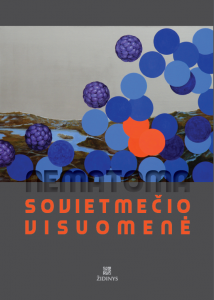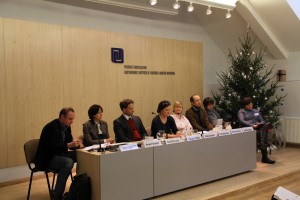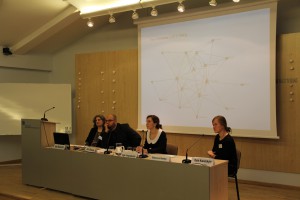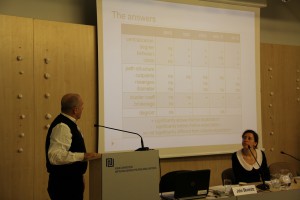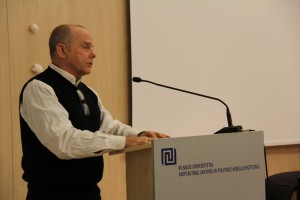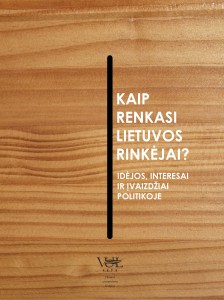Lithuania joined CSES Program
Lithuania is joining the Comparative Study of Electoral Systems (CSES) collaborative program of research by integrating the CSES Module 5 in their 2016 post-election survey.
See more
Pasirodė knyga “Nematoma sovietmečio visuomenė”
Knygos turinį ir įvadą galima rasti čia
Disclosing Invisible Society: Informal and Concealed Networks Under Communism, 5 – 6 December 2014, Vilnius
Kaip renkasi Lietuvos rinkėjai? Idėjos, interesai ir įvaizdžiai politikoje
A book on Lithuanian voters summarizing the results of the Lithuanian National Election Study was recently published by the Vilnius University Press. See more
Conference “Disclosing Invisible Society”
International Conference
Disclosing Invisible Society:
Informal and Concealed Social Networks under Communism
5 – 6 December 2014, Vilnius
Venue: Institute of International Relations and Political Science, Vokiečių g. 10
| Friday, 5 December | ||
| 8:30 – 9:00 | Registration and coffee | |
| 9:00 – 9:15 | OpeningInga Vinogradnaitė, Research Director, Institute of International of Relations and Political Science
Ainė Ramonaitė, leader of the research project “Invisible Society of Soviet-era Lithuania: The Revision of Distinction between Systemic and Non-systemic Social Networks“
|
|
| 9.15 – 10:00 | Keynote Address
John Skvoretz, University of South Florida, President of the International Network for Social Network Analysis Structural Signatures and Hidden Networks: Statistical Models for Social Networks in Totalitarian Social Orders |
|
| 10:00 – 11.15 | Session 1. Unveiling the Structure of Underground Society | |
| Jan Olaszek, The Institute of National Remembrance, Warsaw UniversityBetween Trust and Distrust. The Underground “Solidarity” as a Trust NetworkAinė Ramonaitė, Valdemaras Klumbys and Rytė Kukulskytė, Vilnius UniversityExplaining the Success of Secret Societies: The Structure of Samizdat Networks in Soviet Lithuania | ||
| 11:15 – 11:45 | Coffee break | |
| 11.45 – 13.00 | Crack (in) the Soviet Monolith: the Nature of Social Agencies in Force?Joint Round Table Discussion with the 5th Vilnius Symposium of Soviet and Late Soviet Issues Moderated by Vilius Ivanauskas (Lithuanian Institute of History)Interventions by Nerija Putinaitė (Vilnius University), David Beecher (UC Berkeley), Rasa Baločkaitė (Vytautas Magnus University), Jūratė Kavaliauskaitė (Vilnius University), Martins Kapran (Tartu University), Violeta Davoliūtė (Vilnius University), Felix Ackermann (European Humanities University | |
| 13:00 – 14:30 | Lunch | |
| 14.30 – 16.00 | Session 2. Acting in Secret: Samizdat Networks and Religious UndergroundChair: Arūnas Streikus | |
| Monika Kareniauskaitė, Vilnius University“Samizdat” Networks in Communist Lithuania: Repressed Deviants or Developers of Alternative Public Discourse? Katarzyna Korzeniewska, University of BialystokCatholic Clandestine Activities of the 70s and 80s Lithuania, or How Formal is Informality?Mateusz Fałkowski, Institute of Political Studies, Polish Academy of Sciences
Networks of Contention under Repressive Conditions. The Case Study of CDN Underground Publishing House
|
||
| 16:00 – 16:30 | Coffee break | |
| 16.30 – 18.00 | Session 3. How to “Drop out of the System“? Lifestyle as a Trajectory of NonconformismChair: Jonas Öhman | |
| Li Bennich-Björkman, University of Uppsala; Uppsala Center for Russian and Eurasian StudiesExistential Resistance and the Transition to Pluralism in the Soviet WestJūratė Kavaliauskaitė, Vilnius UniversityCraving for the Road (Out): Uneasy Alternative of the Urban Sub-Cultural Milieu in Late Soviet LithuaniaAinė Ramonaitė and Rytė Kukulskytė, Vilnius University
Building Affirmative Alternative and Staying Visible? Camouflage Strategies of the Ethno-cultural Movement in Soviet Lithuania
|
||
| 18.00 | Reception | |
| Saturday, 6 December | ||
| 9.30 – 11.00 | Session 4. Confronted by the Soviet System: Tactics of Subjugation and ConversionChair: Kęstutis Girnius | |
| Irena Saleniece, Daugavpils UniversityConcealed Resistance Networks under Communism: Real and „Imagined” by PowerNerija Putinaitė, Vilnius UniversityPolitics of Atheization of Population in Soviet Lithuania: From Blind Ideologization to Ingratiating Loyalization Valdemaras Klumbys, Vilnius University
On the Problem of Collective Action of the Soviet Intelligentsia in Lithuania
|
||
| 11:00 – 11:30 | Coffee break | |
| 11.30 – 13.00 | Session 5. Networking Within the System: Informal Networks of PowerChair: Vladas Sirutavičius | |
| Przemysław Gasztold-Seń, The Institute of National Remembrance, Warsaw UniversityBeyond Democratic Centralism: Fractions, Coteries, and Informal Party Groups within the Polish United Workers’ Party in the 80s”Michał Przeperski, Tadeusz Manteuffel Institute of History, Polish Academy of SciencesPatronage and Informal Networks of Power. Mieczysław F. Rakowski as a JournalistSaulius Grybkauskas, The Lithuanian Institute of History
Was the Soviet Lithuanian Nomenklatura a Ruling Clan?
|
||
| 13:00 – 14:30 | Lunch | |
| 14:30 – 16:00 | Session 6. Black Market Economy and “Blat” Networks in the Soviet Period: Notions, Structures and ConsequencesChair: Liutauras Gudžinskas | |
| Hubert Wilk, Tadeusz Manteuffel Institute of History, Polish Academy of SciencesOn the Other Side of the Counter. Black Market of the Articles of Consumption in Poland in the 80Madalina Musca, National School of Political Science and Public Administration, BucharestPrivate Tutoring Phenomenon in The Socialist Romania as a Form of ResistanceKateryna Novikova, University of Euroregional Economy, Józefów
Informal Networks as Individual Social Capital: Post-Socialist Cultural Legacy or Effective Resource
Rūta Žiliukaitė, Vilnius University Blat Relations During Soviet Period in Lithuanian Society
|
||
| 16:00 – 16:15 | Coffee Break | |
| 16:15 – 17:30 | Closing PanelTrapped in The Past? Legacies of Communist Networks in Post-Communist Societies
Panelists: Rustamjon Urinboyev (Lund University), Vytis Čiubrinskas (Vytautas Magnus University), Rūta Žiliukaitė (Vilnius University) |
|
The Conference is organized as a part of the research project “Invisible Society of Soviet-era Lithuania: the Revision of Distinction between Systemic and Non-systemic Social Networks“ funded by the European Social Fund under the Global Grant measure (Nr. VP1-3.1-ŠMM-07-K-02-053)
Call for papers
Call for papers
International Conference
“Disclosing Invisible Society:
Informal and Concealed Social Networks under Communism”
5– 6 December 2014, Vilnius University
In spite of official ideological visions and high ambitions of communist state to overwhelm the entire human lifeworld, (post)totalitarian states across the Soviet Block were not entirely deprived of informal social networking that managed to slip out of the state control. On the one hand, such informal networks included non-conformist youth subcultures, samizdat publishers, non-systemic private circles of intelligentsia, etc. On the other hand, the “invisible” societal fabric also encompassed informal networks of nomenclature and blat networks that nourished upon the communist system itself, distorted totalitarian ideals and the socialist economy but at the same time represented the core of the social reality of the Soviet Block.
Under the communist regime certain informal networks were consistently persecuted, however, the other ones flourished without major systemic state interference. Such a differentiated state approach to informal networks signals about their core differences in nature. However, these distinctions are poorly understood and remain under-conceptualized or submerged in the ambiguity of so-called ‘hybrid phenomena’. The present state of affairs precludes both the adequate understanding of the structure of communist societies and the proper evaluation of the impact of its legacies on social, civic and political developments. What types of social networks, built and inherited in the communist era, contribute to the development of civil society, and what types, on the contrary, lead to “amoral familism”, i.e. corruption, clientelism, patronage, and why?
The Conference aims to bring together historians, anthropologists, sociologists, political scientists and researchers from other disciplines working on various forms of the (self)organization of society in the Soviet Union and the socialist satellite states of Central and Eastern Europe, and/or analysing its legacies on the post-communist social, political and economic development. The event will also include several joint sessions with the 5th Vilnius Symposium of Late Soviet and Post-Soviet Issues. We invite theoretical, empirical and methodological papers analysing informal social networks that cohabitated and reproduced the (post)totalitarian communist system, as well as social networks that generated alternative social lifeworlds and contributed to the breakdown of the communist regime. In particular, we are interested in the application of social network analysis for the exploration of the informal and clandestine society under the communist regime.
The Conference is organized by the Institute of International Relation and Political Science of Vilnius University as a part of the research project “Invisible Society of Soviet-era Lithuania: the Revision of Distinction between Systemic and Non-systemic Social Networks“.
Conference language: English
Venue: Institute of International Relations and Political Science, Vilnius University, Vokiečių str. 10, Vilnius, Lithuania
An application consisting of an abstract (max. 500 words) and a short bio should be sent to aine.ramonaite@tspmi.vu.lt and jogile.ulinskaite@gmail.com. The deadline for applications is extended to 29 September 2014. Accepted applicants will be notified by 10 October 2014.
There is no conference fee. The organizers will cover the accommodation costs of the paper givers.
For more information see: www.tspmi.vu.lt
